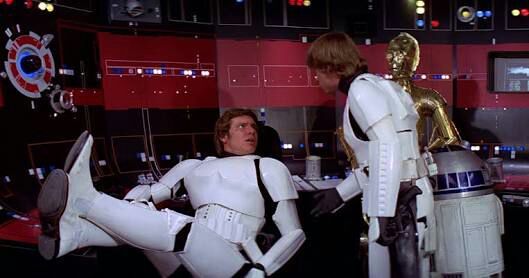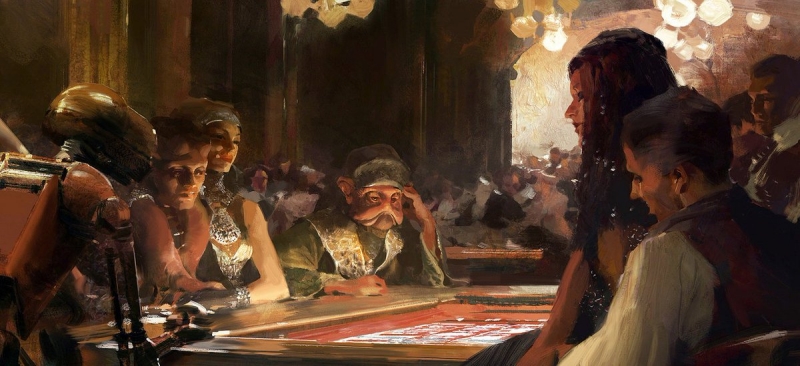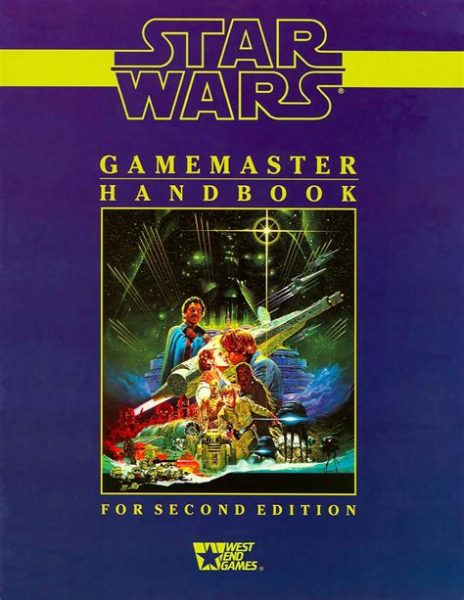One thing I discovered since I started working on the idea of creating a Star Wars inspired campaign in an original setting is that Scoundrels with a Spaceship has actually become a genre in itself. Traveller, Stars Without Number, Scum and Villainy, Coriolis, and Rogue Trader are all RPGs based on that idea, and it has of course always been one of the three campaign styles for half a dozen Star Wars games. Firefly is widely considered a prime example of the genre outside of RPGs, as is Cowboy Bebop, and you can count TheExpanse as well. I think in RPGs, the Space Scoundrel might very well be the second most common archetype for PCs, after the heroic fantasy adventurer.
And it makes sense. It’s a great concept for player characters in a space setting. Characters who are their own boss, who don’t have to take orders from anyone, are not expected to risk or sacrifice themselves for others, are permitted to solve problems by shooting but also to do business with awful people, and who can go wherever they please in their own fast ship. It’s as much freedom as players can have in a game. Which is great.
But being expected to be largely self-interested is also a problem. The players are free to do anything they want, but the archetype also tells them to always ask “What’s in it for me?”

It’s a fun scene when selfish Han Solo decides he’s had enough with all this nonsense and is just going to sit the rest of it out and wait for Obi-Wan so they can leave, and Luke has to really put all the work to get him to help save Princess Leia. But it’s fun about once. And only because we can watch it unfold without having to do the work. In the end, Luke only gets him to cooperate and have more adventure by promising him that there will be a huge reward. And once he gets his cart load of money, he’s immediately annoncing that he’s done and is out of whatever else Luke and Leia are uo to next. As GM or a player, you really don’t want to have to go through this whole song and dance with other players who think it’s spot on for their characters every two weeks. This stuff is getting really tired after 2 minutes.
As I have come to see it, having adventures that have the events of the campaign largely scripted out pretty much defeats the purpose of RPGs. Nobody gets into RPGs for the first time because other players tell about cool stories they are getting told. It’s all about the promise to be able to create stories and play characters who can go everywhere and do anything they want, and the GM can immediately describe how the world and other characters in it respond to that. What’s the point of customizing your character’s abilities and doing all the dice rolling when the overall sequence of events and ultimate outcome are already determined?
But how do you have grand adventures full of excitement and thrilling danger when the default assumption for the PCs is that they are only looking out for themselves and have no desire for justice? As cool as the concept of the space scoundrel is for characters, it’s not actually a greating starting position for grand adventures. This has been on my mind for quite a while, but thinking about it more deeply over the last few weeks has led me to a couple of conclusions on what might be done to mitigate these issues.
The campaign needs a clear premise: When you want to run or play a campaign about a bunch of space truckers, you probably don’t want to actually do a campaign about space trucking. Some people might actually looking for that, but generally when you get into this type of games, it’s the promise of action packed adventures that draws everyone in. It’s the times when the space truckers get interupted in their space trucking when all the cool and exciting stuff happens. Flying around in your ship and being free to take on any job you want sounds very interesting, but I think you need to be more specific and narrow down more clearly on what will actually happen in this campaign. It can be the GM who creates a more specific outline, or the players who decide on a specific theme they want their adventures to revolve around.
The characters and activities should match the premise of the campaign: This sounds super obvious when you phrase it like this, but it really isn’t. When the premise of the campaign is space truckers and the players make characters to be good at space trucking, but the adventures turn out to be primarily exploring an alien jungle planet, or fighting off an alien invasion, there will be a misalignment of expectations. Instead, the premise of the campaign should have been about space truckers who find themselves on a alien jungle planet which they are going to explore. The characters the players make may be almost identical, but it will likely make a real difference in how the players will go around looking for adventure. Instead of looking for ways to get their ship back into space and deliver their cargo, they’ll be more likely to embrace diving into the jungles and their mysteries.
To get players to be proactive, they need to be invested in the world: If the primary motivation for players and characters is to get rich by cashing in job payments, or to pay off angry dangerous people who are after them, then there is little to motivate them to go towards the danger. Which is where all the really cool and fun stuff is going to happen. To get players to not just grab their money and leave as soon as possible after dealing with the issue of the current adventure, they need to care about what’s going to happen to NPCs, groups, and places that are still being in danger. To protect themselves is typically very easy for PCs, especially when they have a space ship. Just leave. But when the players also care about the fate of people who can’t just leave, they have a reason to stay and continue confronting the threat. Early adventures in a new campaign should attempt to get the players invested in the conflicts of the setting.
Don’t start the campaign with nobodies who have no connections: For some reason, the generally assumed common start for characters in a new campaign is that they are completely new nobodies who have not done anything significant yet, since they start out with the minimal character stats and have no experience points. They also have no connections to anyone, since the players have not yet meet any other characters in the game world. This works well enough in an oldschool dungeon crawling campaign where every aspiring adventurer from the street can just stroll over to one of the old ruins at the edge of town and start scavenging for ancient treasures while fighting off roaming monsters. But this really provides nothing useful for campaigns with a more narrative focus and when there is no destiny for the characters waiting to be fulfilled. Instead of waiting for the players to find some justification for their roaming, self-interested characters to get themselves involved in other people’s business, have the players make characters who are already involved. Han Solo was already an established smuggler with considerable reputation, who had dangerous people coming for his head when the story starts. Even Luke is not a nobody who randomly decides to rescue a leader of the Rebellion he know to be in trouble. Before he goes to try saving her, he learns that Obi-Wan is an old pal of his father and has his home and family destroyed by the Empire’s terror. When the adventure actually starts, he is already very involved.
Money is still really attractive: In many fantasy games, all the beat equipment is magical and can generally not be bought with money. And all the best weapon and armor that money can buy can typically be afforded after the first adventure. From that point on, promising the players that they will be paid great rewards generally does very little to make them any more motivated to do something than they already are. They probably would do it anyway even if there was no reward. But that’s typically not at all the case in Space Opera. Really heavy power armor or big ass guns might be very rare and highly restricted, but there’s probably still thousands of them that have been produced in a giant factory, rather than being the unique life’s work of some wizard. And when it comes to spaceship upgrades, there is pretty much no limit. There is always going to be more better and cooler stuff to buy and the players will never sit on money for which they can’t find a good way to spend it.


